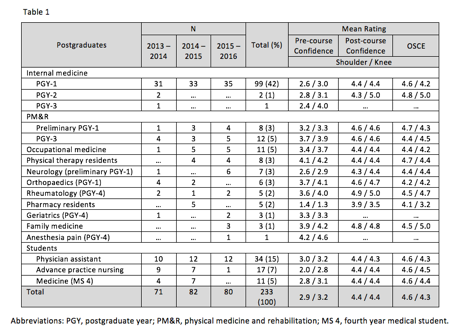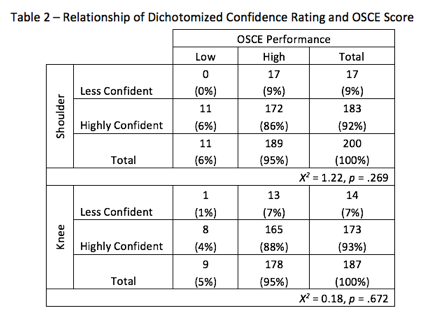Session Information
Date: Monday, November 14, 2016
Title: Education - Poster
Session Type: ACR Poster Session B
Session Time: 9:00AM-11:00AM
Background/Purpose: The Musculoskeletal (MSK) Education Week for medical students, residents, fellows, and trainees of other health professions has been sustained since 2011. The objective of this study was to examine the relationship between self-reported measures of confidence and observed measures of competence in this multi-year, multidisciplinary cohort of trainees.
Methods: The MSK Education Week emphasized the evaluation and management of shoulder and knee pain. Self-reported confidence was captured utilizing a 5-point Likert scale at the start and conclusion of the program. Competence was measured at the end of the program by a validated 2-station objective structured clinical examination (OSCE) with a rater unaware of the self-reported confidence. Self-report ratings of 3 (neutral) or lower were categorized as Òless confidentÓ; performance on the OSCE was categorized as ÒlowÓ for those lower than 2 standard deviations from the mean. Chi-square was calculated for dichotomized self-assessment ratings and OSCE scores, and PearsonÕs correlation was performed on all data.
Results: Since 2013, 233 trainees have participated in the MSK education week. Response rates producing complete data sets were 86% for shoulder and 80% for knee. Confidence ratings by participants across all disciplines increased after the course (Table 1). Mean OSCE score was 92% for the shoulder and 86% for the knee. Table 2 shows the relationship of dichotomized confidence ratings and OSCE scores; there was no significant difference between the groups (shoulder X2 = 1.22, p = .269; knee X2 = 0.18, p = .672). PearsonÕs coefficient indicated no correlation between confidence and competence for the shoulder (r = 0.02) or the knee (r = 0.1). 
Conclusion: The MSK Education Week is a sustainable program that has demonstrated effectiveness across a range of disciplines and learner levels for over 3 years. Following the program, the majority of participants were both highly confident and highly competent. A small number of participants whose observed competence was low were nonetheless highly confident. The lack of correlation between self-report and objective measures supports the continued development and use of meaningful external measures of competence for trainees in medical education and health professions programs.
To cite this abstract in AMA style:
Barker AM, Cannon GW, Battistone MJ. Confidence and Competence of Medicine Trainees’ Musculoskeletal Skills: A Report of the Relationship from a Large Multi-Year, Multidisciplinary Cohort [abstract]. Arthritis Rheumatol. 2016; 68 (suppl 10). https://acrabstracts.org/abstract/confidence-and-competence-of-medicine-trainees-musculoskeletal-skills-a-report-of-the-relationship-from-a-large-multi-year-multidisciplinary-cohort/. Accessed .« Back to 2016 ACR/ARHP Annual Meeting
ACR Meeting Abstracts - https://acrabstracts.org/abstract/confidence-and-competence-of-medicine-trainees-musculoskeletal-skills-a-report-of-the-relationship-from-a-large-multi-year-multidisciplinary-cohort/

